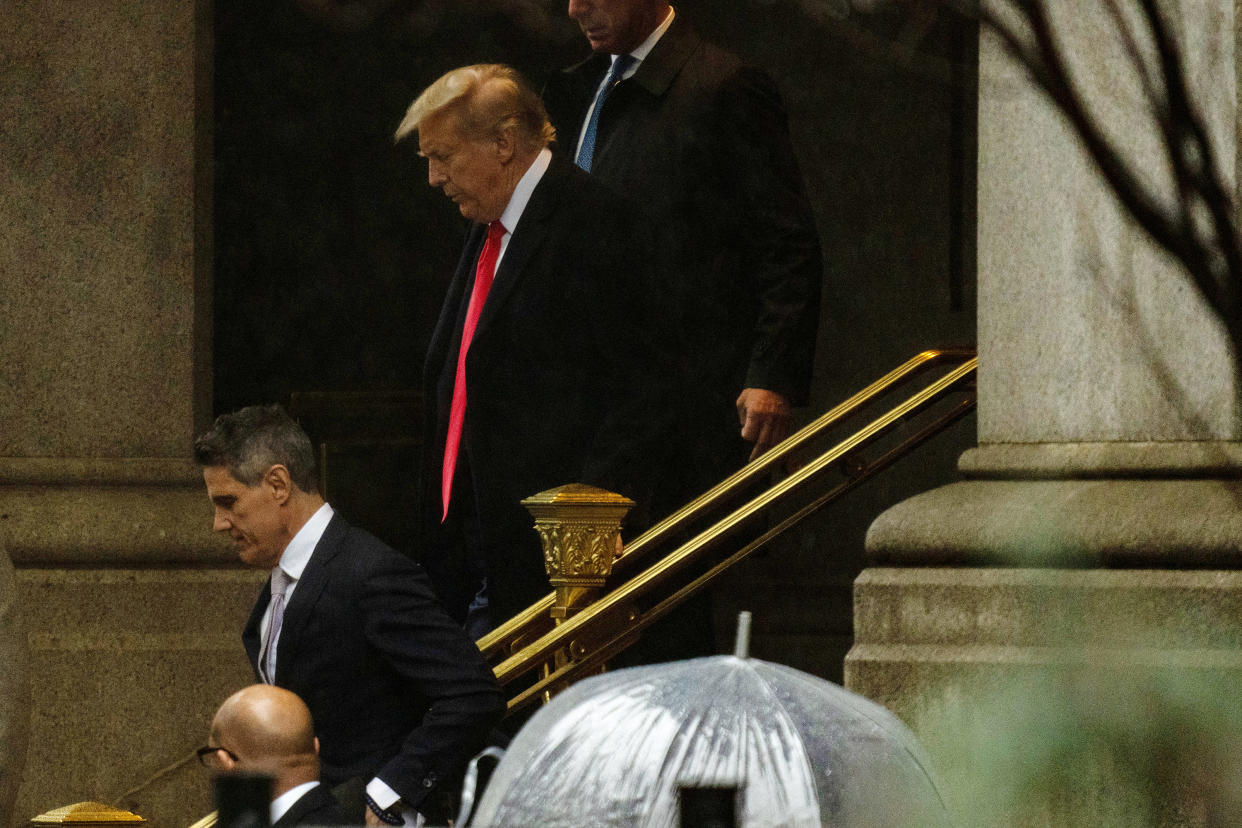Donald Trump sits through brutal grilling on presidential immunity at federal Court of Appeals

- Oops!Something went wrong.Please try again later.
- Oops!Something went wrong.Please try again later.
Former President Donald Trump returned to a federal courthouse in Washington, D.C. on Tuesday as an appeals court vigorously grilled his lawyers about his claim to be immune from prosecution in his federal election interference case.
The former president sat in the courtroom as members of a three-judge panel appeared extremely skeptical of virtually all his lawyers’ arguments, especially one claim that Trump could not be tried because he was not convicted at his Senate impeachment trial after the Jan. 6 attack on the Capitol.
“Could a president order SEAL Team Six to assassinate a political rival? That’s an official act,” asked Appeals Court Justice Florence Pan.
“He would have to be … impeached and convicted before the criminal prosecution,” replied Trump defense lawyer John Sauer.
“If he weren’t (impeached), there wouldn’t be criminally liability?” the judge retorted incredulously.
Prosecutors rattled off a series of scenarios in which a president commits brazen wrongdoing but somehow manages to avoid being impeached and convicted by Congress.
Trump claimed the hearing was a victory for him, echoing his lawyer’s claim that his trial would open the door to prosecutions of other presidents.
“It’s the opening of a Pandora’s box (and) it’s a very sad thing,” Trump said. “That’s your real threat to democracy.”
Trump sat just a few feet away from Special Counsel Jack Smith during the 90-minute hearing, but did not appear to look at him.
The former president scribbled furiously on a pad and handed several notes to Sauer. He nodded in approval when the lawyer insisted he was acting as president when he tried to overturn the election.
The judges also roasted Sauer because the former president argued during his impeachment trial that the congressional action was unneeded because he could later be criminally charged.
Trump stared blankly and pursed his lips as Pan quoted one of his lawyers’ making that point during impeachment.
Sen. Mitch McConnell (R-Kentucky), who scuttled Trump’s impeachment case, also famously said at the time that Trump could be prosecuted for alleged wrongdoing.
Although Trump’s arguments appeared to be a legal Hail Mary, the outcome of the arguments carries huge ramifications both for the landmark criminal case against Trump as well as the broader question of whether an ex-president can be prosecuted for acts committed while occupying the White House.
It could also likely set the stage for further appeals before the U.S. Supreme Court, which last month declined a request to weigh but could still get involved later.
Smith hopes the appeals court will reject Trump’s claims quickly. Smith wants to ensure Trump faces trial as scheduled on March 4 or as soon as possible and before the November election.
Trump is hoping to stall any trial through a protracted appeals process, until potentially after the election when he hopes to win a return to the White House.
Another option would be for the court to refuse to take the case on technical grounds and send the case back to District Court Judge Tanya Chutkan for trial. Both Trump’s lawyers and prosecutors argued against that option, urging the judges to decide the case on its merits, one way or the other.
Trump sought to use his appearance to bolster his already overwhelming dominant lead in the Republican presidential primary race, which kicks off with the Iowa caucuses on Monday.
He argued that his actions in pushing to overturn the 2020 election were part of his official duties and that his prosecution is part of a partisan witch hunt designed to derail his reelection.
“Of course I was entitled, as President of the United States and Commander in Chief, to Immunity,” he wrote in a social media post, adding, “I was looking for voter fraud, and finding it, which is my obligation to do, and otherwise running our Country.”
Trump’s lawyers say courts have no authority to scrutinize a president’s acts and decisions. They say giving the green light to prosecuting Trump would open the door to future “politically motivated” cases like prosecuting Biden in Texas for allegedly mishandling immigration on the southern border.
Smith’s team has said presidents are not entitled to absolute immunity.
They also say it’s far-fetched to defend Trump to enlist fake electors in battleground states won by Biden and pressing Trump’s vice president, Mike Pence, to reject the counting of electoral votes on Jan. 6, 2021 — actions that fall far outside a president’s official job duties.
“Immunity from criminal prosecution would be particularly dangerous where, as here, the former President is alleged to have engaged in criminal conduct aimed at overturning the results of a Presidential election to remain in office,” Smith’s team wrote in a brief.
Prosecutors say that if Trump’s view of the law were to be accepted, a president could get away with accepting bribes, selling nuclear secrets to a foreign adversary or even assassinating rivals.
The judges seemed very sympathetic to that argument, even echoing some of the hypothetical misdeeds that a future president could commit and still evade accountability.
It’s not clear how quickly the panel will rule, though it has signaled that it intends to work fast.
Trump could appeal a potential loss to the Supreme Court but it’s not at all clear whether it would agree to hear it.
Chutkan already rejected the Trump team arguments, ruling on Dec. 1 that the office of the presidency does not confer a “get-out-of-jail-free pass.”
Smith’s team, determined to keep the case on schedule, sought to leapfrog the appeals court by asking the Supreme Court to fast-track the immunity question and rule in the government’s favor. The justices declined, without explanation, to get involved.
____

